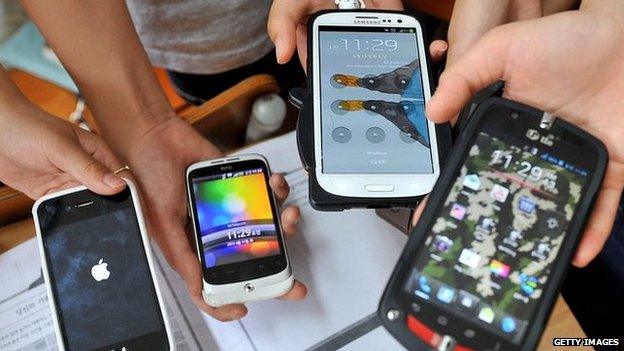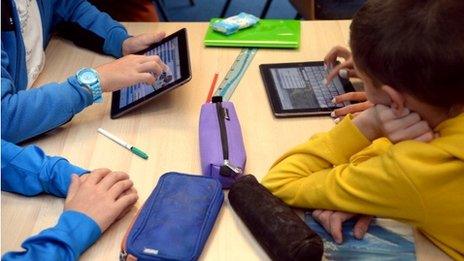Parents unaware of dangers faced by children on smartphones
- Published

Parents are advised to set talk to their children about how they use their smartphones
Many parents are out of touch with the dangers faced by their children on tablets and smartphones, according to a poll by BBC Learning.
Almost one in five children said they had seen something on their devices that had upset them, twice the number parents had thought.
A separate study found that just over 20% of parents do not monitor what their children are doing online.
The research was commissioned as part of Safer Internet Day.
While 90% of the parents surveyed by the BBC in England said they had spoken to their children about staying safe online when using a tablet or a smartphone, most said they allowed their children to use them unsupervised.
Parental controls
"Unfortunately, none of us - of whatever age - is immune from encountering problems online," said Tony Neate, chief executive of Get Safe Online.
"Without using controls such as built-in security, safety and privacy features and search engine filters, children will almost certainly run into something that really isn't appropriate for their age, or any age."
The survey also found that teenagers aged 13-16 were more vulnerable to being bullied online than those aged 8-12. However, parents worried less about the older group using a tablet.
David Emm, senior security researcher at Kaspersky Lab said parents were not often as aware of the dangers of using the internet on tablets and smartphones as they were with PCs.
"When children use mobile devices to access the web, they are using the same internet, with the same risks," he said.
"There is a common misconception that smartphones and tablets don't need the same level of protection as a PC.
"But with such a high percentage of parents not having a clear view of their children's online activity, this way of thinking needs to change."

Over 50% of parents had set up filters on their tablets for when children used them
Unmonitored losses
Apple's iPhone and iPad have restrictions, or parental controls, that can be set using a passcode.
Access to certain apps or websites can be blocked completely or restricted to age appropriate content.
Restricted profile accounts can also be set up on Android smartphones and tablets.
Over 50% of parents who took part in the BBC poll said they had set up parental controls and filters on their tablets but only 40% said they had done the same on their children's smartphones.
Kapersky Lab's own survey revealed that 18% of parents had lost money or data from their own phone or tablet because their children had been using it unmonitored.
In-app purchases made by children when playing games on their parents' phones are often cited as a reason for money being spent unwittingly.
Apple was recently told to refund $32.5m (£19.8m) to parents whose children had made purchases without their parents' consent.
Adults were also being warned to stay safe online as Microsoft released its annual online consumer safety research.
It showed that 5% of consumers in the UK had fallen victim to a phishing attack - losing on average £100. Meanwhile, 3% said they had suffered identity theft which had ended up costing them £100.
The software giant recommended that users set PINs for their mobile phones and strong passwords for online accounts.
- Published5 February 2013
- Published28 January 2014
- Published21 October 2013
- Published8 January 2014